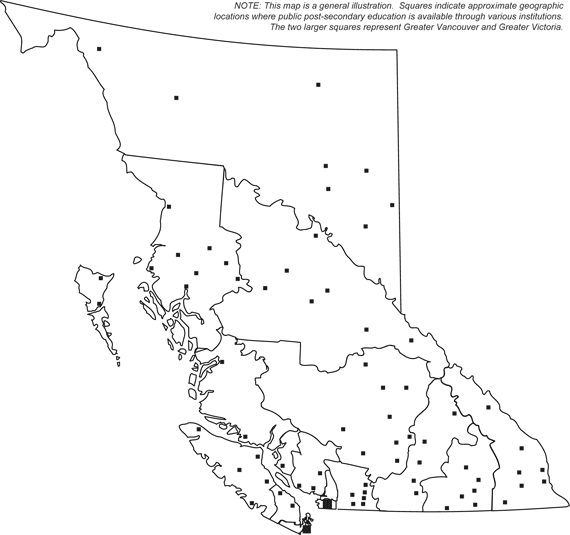Ministry Overview
Purpose of Ministry
The Ministry of Advanced Education provides leadership and direction, establishes policy, and provides funding to the post-secondary
system and to the research and technology sector. The Ministry also provides financial assistance to students. The public
benefits of post-secondary education include providing people with knowledge, skills and training that communities, employers
and entrepreneurs need, as well as enabling citizens to participate in all aspects of society. The public benefits of research
and innovation include the economic activity and jobs produced through commercialization and the expansion of knowledge.
The majority of public services for which the Ministry is responsible are delivered by institutions and organizations within
the public post-secondary system and within the research and technology sector. Various mechanisms are in place, such as legislation,
funding agreements and reporting requirements, to ensure accountability for public funds.
Public post-secondary institutions in British Columbia, like those in other provinces, have a significant and appropriate
degree of autonomy from government in many areas. This autonomy allows institutions the necessary independence to determine
how to effectively meet the needs of their students, their communities and the province. These institutions develop and deliver
programs and courses, provide education and training to students, undertake research, and serve the educational needs of their
communities.
"An Accountability Framework for British Columbia's Public Post-Secondary Institutions" recognizes the autonomy of institutions
and the need for government to address post-secondary priorities. The Framework supports funding agreements and reporting
requirements that emphasize outcomes or results. The Ministry consults with representatives from public institutions to ensure
that performance measures targets are reasonable while reflecting government's priorities. Expectations are communicated to
institutions in annual budget and accountability letters, which outline Ministry funding to be provided and targets. Public
institutions allocate Ministry funding as they consider necessary to meet their targets, and provide the Ministry with information
needed to ensure accountability for results and use of public funding. Each year, institutions also issue three-year service
plans to inform the public of their goals, objectives, measures and targets, and annual reports to inform the public of the
results achieved. The Framework was reviewed in 2006/07 to assess its current operation. Options for future development are
being considered.
The internal and external governance and accountability structures for most public post-secondary institutions are set out
in legislation. The legislation provides for boards of governors with responsibility for operational and financial matters.
Statutes also outline academic governance structures with responsibility for decisions concerning academic matters such as credentials, curriculum and standards.
See Appendix 1 for a list of legislation administered by the Ministry.
In addition to public post-secondary institutions, British Columbia also has a diverse private post-secondary sector that
offers a range of education and training programs including degrees (e.g., theological), career training, and English as a
Second Language. Unlike their public counterparts, private post-secondary institutions are not funded by the Ministry. However,
private degree granting and career training institutions are subject to legislative and regulatory frameworks including the
Degree Authorization Act and the Private Career Training Institutions Act.
The Ministry's expanded mandate for research and technology includes oversight of existing initiatives: funding contributions
to provincial research organizations such as Genome British Columbia; internship funding for graduate students; the Premier's
Technology Council and British Columbia Innovation Council1; research funding, for example, to the British Columbia Knowledge Development Fund and Leading Edge Endowment Fund; and inter-ministry
collaboration and partnership on research initiatives. Research-related initiatives under development are also overseen by
the Ministry.
The Ministry also works with the Knowledge Network, the province's public educational broadcaster. The Network was part of
the Open Learning Agency, which is in the process of winding down. New legislation for the Knowledge Network is planned for
2007.
The Ministry provides direct service to the public through administration of the British Columbia Student Assistance Program,
which provides loans and grants to eligible post-secondary students for education and living costs. The Program is a needs
based, publicly-funded program created to help eligible students with the costs of post-secondary studies while enrolled at
public and designated private institutions. Also administered are: merit-based scholarships; bursaries targeting labour market
demands; other programs on behalf of the federal government and other provincial ministries and agencies; and the Canada Millennium
Scholarship Foundation Bursary. The Ministry is also responsible for ensuring the loans it provides are repaid by the students
once their studies are completed. As a result, it expects designated institutions to focus on student success — avenues to
retain students until the completion of their program and to ensure their overall employability is improved. The Ministry
monitors default rates as part of its obligations under the Pan Canadian Designation Policy Framework, which is in place to
address taxpayer protection, accountability, informed choice and consumer protection for government student loans.
The following map shows that public post-secondary education programming is available at many locations across the province.
Public post-secondary education is also available online through BCcampus. In addition, over 500 private post-secondary education
institutions are located throughout the province.
Public Post-Secondary Education Widely Available in B.C.

Vision, Mission and Values
Vision
Enabling British Columbians to prosper through education, training, research and innovation.
Mission
To provide leadership in delivering excellent, accessible post-secondary education for learners and enabling an integrated
and dynamic approach to research and innovation.
Values
The following values guide the Ministry in its work.
